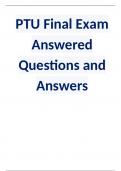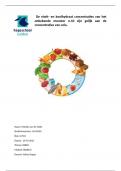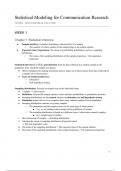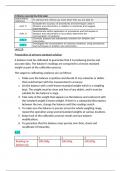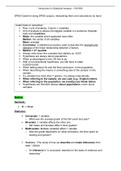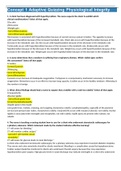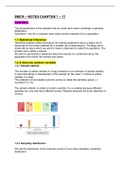Lecture 1: ontological security
Some recurring features:
> Stability: freedom of anxiety about what may happen next. Security as a low probability of damage
to acquired values. We want tomorrow to be more or less the same as today
> a stable sense of continuity and order, as this helps us to give meaning to our lives, that the world is
a stable and safe place, predictable and in general positive
> Ontological security resembles a protective bubble
1. stable home
2. contract with society is not harmful → also institutions and government
3. feeling that nature is not out to get us
> An important condition for ontological security is trust and continuity. If we have to check
everything for possible risk and danger all the time, we will be anxious all the time
> We need to have a stable sense of ‘home’ – and ‘home’ can also be a sense of community,
nationhood, national identity or the notion that society as such is a safe place for everyone.
> We need a sense of contract with society and our fellow citizens. So, that is also about trust in our
leaders and institutions
> Without this sense of trust, home, stability and continuity, distrust will surface which can paralyze
us, or society at large; and our sense of ontological security will be challenged
> So, these are the core terms and concepts of this course: trust, identity, continuity, stability, notions
of home, predictability, autonomy, resilience, positive view of the Self and the future
> We want tomorrow to be more or less the same as today
The concept of Ontological Security was first developed by R.D. Laing in the book The Divided Self.
> Psychoanalytical approach - existential anxieties (looking at patience)
> connecting mental well-being of the individual to society (ideas of the sixties that society makes
people sick)
> Critical approach - the behaviour of patients does not reflect a mental disease but is expressive of
their existence
> People will get sick from an absence of the assurances derived from ontological from ontological
security: autonomy, consistency, identity
Anthony Giddens (1990/1991) used a sociological approach to ontological security
> societal structures impacting ontological security
> importance of social narratives and routines in which people are embedded
> narratives: people need a story about the society they are living in, how they relate to society, what
is been expected from them, what they can expect from others
Connected to narratives are routines - enabling people to live their life in a stable and more or less
predictable way
> Ontological security depends on our ability to have faith in those social narratives and routines in
which we are embedded – gives us sense of identity and agency – in control, decide on a life of their
own choice
> Otherwise, we would constantly be threatened by a notion of risk and danger
> Society would be experienced as a hostile place
Narratives and routines are context-dependent – public space, at home, in-class, sport, festivals
> Formal/explicit and informal/implicit narratives and routines
,Dr. J. van Buuren
> Narratives and routines are never fixed, always changing
> Learning trajectory – how to ‘sense’ what is appropriate and what is not
> Clash between self-image and how others perceive us
Influence of societal conditions and transformations (Bell, 2019)
> uncertainties about the future - more choice and opportunity - but more choice also can mean more
complexity, pressure and anxiety
> tension between expectations and reality
> you can achieve anything in life, you can go where you want, you can do what you want, you can
have what you want to…
> succes is a choice
> however, reality is quite different: not everyone can have it all
Increasing school pressures
> the pressure to perform
> the pressure to be excellent
> the pressure to be better than others
> the pressure to make choices that seems to be defining the rest of your life
> the pressure to sustain a certain image of yourself
> FOMO
> Ontological security does not refer to ‘classic’ security: physical danger, survival, crime, war…
> The concept of ontological security typically refers to “security not of the body but of the Self, the
subjective sense of who one is, which enables and motivates action and choice” (Mitzen, 2006: 344)
> It is more about “security as being” than “security as survival”; It is about people's ability to give
meaning to their lives. Meaning is found in experiencing positive and stable emotions, and by
avoiding chaos and anxiety (Giddens, 1991)
> Emphasizing stability – negative reading of ‘change’
> ‘Status quo bias’ (Kinnvall and Mitzen 2020) • Can change and disruption also be positive or a
liberating practice?
> Rossdale (2015): the ‘radical disruption’ of the Self can have a positive effect
> Not everybody wants tomorrow to be the same as today…
Critique on the concept of Ontological Security
> Individuals and communities relate different to change and dynamics
> Related to different personalities, different social and economic positions, age or gender, culture,
mainstreamed or marginalized communities, political affiliation, different contexts
> Change can be threatening and liberating
> Liberating force of disruption can also have cultural dimensions related to identities – or multiple
identities
> Fixed identities give structure and stability – but also can be an identity prison
> Rossdale (2015) uses Queer Theory as an analytical perspective
> Questioning the stability of identities and binaries as natural state of affairs/being
> Questioning the binary categorization of sexual and gender identities
> Rossdale: look at the ‘open mesh of possibilities, gaps and overlaps’ of identities
> Disruption of established identities signal positive opportunities
> Disruption of routines, narratives, structures and practices can lead to both anxieties and liberation
and experiment
, Dr. J. van Buuren
> Kinnvall and Mitzen (2020) acknowledge the potential ‘reactionary’ bias of ontological security,
however, they think it is possible to ‘rescue’ the concept
- Anxiety and discomfort can also be preconditions for creative change and realizing alternative
possibilities
- ‘Existential anxiety is a phenomenon that is characterized by multifinality, where the same
cause can result in many different effects.’ (2020: 247)
- multifinality: cause can lead for some to liberation for some to disruption
> Some argue for (radical) change, others feel threatened by this change
> Some want to defend the status quo or want to go back in history, others feel threatened by it
> Clashes not only between individuals/communities and the system or the establishment
> Clashes within societies, between different sections of society, related to the same, underlying
major societal transformations
Ontological Security
> Course objective: ‘Students are able to reflect on the concepts of crisis and security as a political,
social and mental construction’
- Security and insecurity is experienced and practiced differently in different places and at
different times (Bubandt 2005: 291) → not an objective definition
- Multifinality: comparable causes can result in many different effects
- Different settings, different experiences, different actors, different discourses
> Vernacular Security (Bruband, 2005; Jarvis, 2019)
- a fundamentally empty concept
- no prioritisation of particular populations or actors
- avoids universalist conceptualisation of (in)security - context-specific
- vernacular security is more an approach than a concept
> we now have a first idea of what ontological (in)security is
> in the remaining courses we will use a threefold approach
- what is ontological security? Conceptual definitions and practical examples
- What threatens ontological security? So: what societal transformations and events (‘drivers’)
are producing a sense of ontological insecurity?
- How do people or communities react to (perceived) threats to their ontological security? How
do they try to restore their sense of security?
> Dialectics - a dynamic approach instead of a static approach
> threefold approach is related to the skill of reading and understanding current society - and future
developments
- Related to the fundamental idea that both ‘security’ and ‘insecurity’ are political, social and
mental constructions
- Related to the fundamental connection between the macro level and micro level – people
caught up within global political dynamics
- Individual anxieties caused by major societal transformations
Some Challenges
> connecting different levels - macro & micro
- Ontological security relates to individual perceptions as influenced by major societal
transformations
- The individual is not our level of analysis although we talk all the time about people

